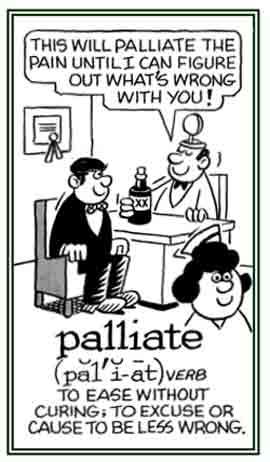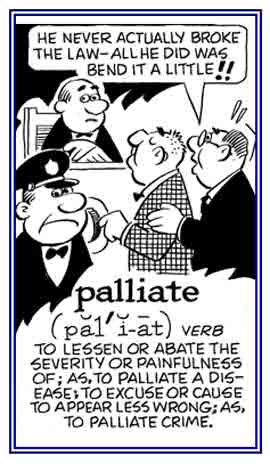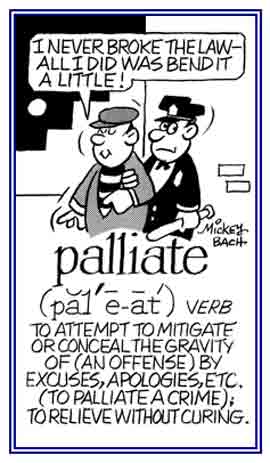palli-, pallio, pallit-
(Latin: mantle, covering; to cloak, to cover)
2. Vestment consisting of a band encircling the shoulders with two lappets hanging in front and back (Roman Catholic Church).
3. In zoology, a protective layer of epidermis in mollusks or brachiopods that secretes a substance forming the shell.
4. The layer of unmyelinated neurons (the gray matter of the brain) forming the cortex of the cerebrum.
2. A reference to the mantle of a mollusk, brachiopod, or a bird.
2. To ease or to reduce the effect or intensity of something: Thomas tried hard to palliate his sad feelings for the loss of his mother, but it wasn’t possible.
3. To cover up; to hide; to conceal: Jack often lies to his parents and palliates his actions by saying that it is all right because all of his friends lie to their mothers and fathers, too.
4. To make less emphatic or pronounced; to moderate, mitigate, qualify or tone down; especially, regarding one's actions or comments: Eddie palliated or tried to excuse the statement he made at the dining table during dinner when he said that his sister was engaged to be married, even though she wasn’t!
5. To take up a more moderate explanation, to compromise; to rationalize: Rebecca palliated the fact of not getting the job she applied for by saying that it was too far from her home or that the employer didn’t like her, instead of saying that she didn’t qualify for it.
6. To disguise the seriousness or gravity of an offense: There is no way to excuse or to palliate Bill's son of his bad behavior.
To palliate is to consider some wrong action or behavior to be less wrong than it has been considered to be, or someone palliates a crime in order to hide or to conceal its enormity or its brutality.
7. Etymology: from Latin palliare, "to cloak, to cover".

Go to this Word A Day Revisited Index
so you can see more of Mickey Bach's cartoons.
2. The action of disguising or seeking to make less conspicuous, the enormity of (a crime, etc.) by excuses and apologies; extenuation; excuse.
3. The alleviation of the symptoms and incidents of disease without curing it; hence, alleviation, mitigation, and temporary relief.
2. Relating to an agent that alleviates or eases a painful or uncomfortable condition.
3. Serving to relieve (a disease) superficially or temporarily, or to mitigate or alleviate (pain or other suffering).
4. A reference to cloaking or to concealing something from others.
The objectives of palliative cares involve therapies that are meant to improve the quality of life for both the patients and their families.
Palliative care is provided by a team of physicians, nurses, physiotherapists, occupational therapists, and other health professionals who work together with the primary care physician or other specialists in order to provide extra support even for patients who don't have the aid of hospital or hospice staff.
Palliative care can be provided in several places including hospitals, in the patient's home, as part of other community palliative care programs, and in skilled nursing facilities.
Palliative care makes use of a multidisciplinary approach to patient care by relying on input from pharmacists, nurses, chaplains, social workers, psychologists, and other allied health professionals in formulating a plan of care to relieve suffering in all of the areas of a patient's life.
This multidisciplinary approach allows the palliative care group to address physical, emotional, spiritual and social concerns that develop with advanced illnesses.
2. Etymology: derived from Latin palliare, "to cloak" and refers to specialized medical care for people who have serious illnesses.2. Etymology: from Latin palliat, "cloaked"; from palliare, "to cloak, from pallium, "cloak".
A cloak is a type of loose garment that is worn over indoor clothing and serves the same purpose as an overcoat; it protects the wearer from the cold, rain or wind, for example, or it may form part of a fashionable outfit or uniform.
Although the cartoon is presenting a verb, it also serves as an example of a pallator.


